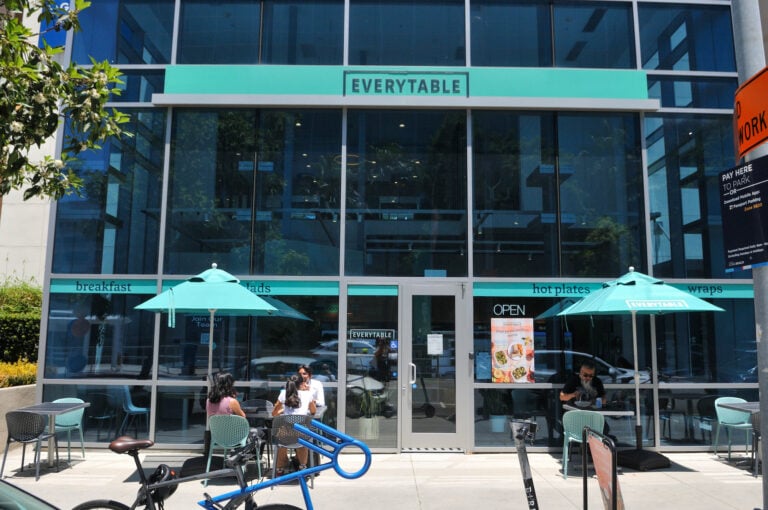
Los Angeles recently saw an influx of capital for companies looking to disrupt the food-supply system. A plant-based protein venture fund, a carb-disrupting food-tech company and a grab-and-go healthy food chain raised a combined $54 million at various investment round stages in June.
In a difficult fundraising environment, the continued expansion of the healthy and alternative food sector reflects a growing consumer awareness about nutrition and its accessibility disparity.
“I strongly believe that food is the next big boom,” said Jennifer Stojkovic, a general partner at Joyful Ventures LP, a newly formed venture capital firm investing in companies innovating sustainable protein solutions based out of West Hollywood. “We can’t eat air and we increasingly are facing constraints that are insurmountable with our current system.”
Stojkovic’s fund raised $23 million and has already invested in two startups whose protein alternatives are produced in a lab, breathing life into an alt-protein sector that slowed down amid high inflation rates. In June, the Department of Agriculture approved the first-ever cell-cultivated meat for two American manufacturers.
Glendale-based Alpha Foods, Inc., a company producing plant-based meat alternatives, partnered with global market research firm The Harris Poll to gauge public sentiment towards dieting trends. According to the report, which was piublished last year, Americans are embracing a fluid spectrum of eating more than just fast food or processed-food options.
Los Angeles has long been considered ahead of the plant-based and healthy food trend curve. Local companies including Manhattan Beach-based Beyond Meat Inc., Playa Vista-based Thrive Market Inc. and Culver City-based Daring Foods Inc. have attracted widespread consumer attention in the last decade. Now, the next wave of innovators in the space want to capitalize on the hype by making the products more affordable.
High value to low cost
While the city has played a part in elevating organic or non-GMO labels to the mainstream, fresh foods with these stickers are still hard to come by in food deserts in Los Angeles.
The USDA defines urban food deserts as a neighborhood where a third of the population live more than one mile from a grocery store. Multiple neighborhoods in the South Los Angeles region do not have grocery stores, farmers’ markets or healthy food providers residents can easily access.
This tale of two cities nutritionally separated largely by income drove the funding narrative for Vernon-based Everytable PBC — which recently received $25 million from impact investors Dohmen Co. Foundation in a series C-2 round.
Everytable is a grab-and-go healthy food provider offering variable prices dependent on the average income of the storefront’s ZIP code. For a restaurant scene often charging $20 for fresh-food plates, this unique pricing model fit Dohmen’s accessibility mission.
“While diet-related disease is affecting every community across the nation, it’s disproportionately impacting marginalized communities,” said Rachel Roller, president and chief executive of the Dohmen Co. Foundation. “That was one of the reasons why Everytable was just such an attractive applicant for the fund, because they’re doing such great work to address those inequities.”
Everytable continues to expand its retail presence in Los Angeles and New York, where its two central kitchens preparing all storefront meals are located. However, the planned pace for openings has been scaled back from the company’s initial 75 storefronts slated to open in 2023.
According to Jered Newell, Everytable’s chief financial officer, the company is testing a kiosk model with a nationwide drug store chain to reduce the new-market entry costs.
“We’re changing how we think about expansion to do it in a way that’s the most capital-efficient,” Newell said. “We haven’t closed any stores. It’s just a matter of how do we expand in a market and create awareness and availability.”
The Dohmen Co. Foundation met Everytable representatives at The White House Conference on Hunger and Nutrition in September. While the foundation is a nonprofit, its venture fund invests in for-profit companies working to improve food access.
With its contribution, the foundation joins 21 investors that have funded $110 million in Everytable over nine rounds. In just the past year, the company’s valuation has increased, with $80 million raised since August 2022.
“If you think of our mission of transforming the food system, it’s quite audacious, which will require additional capital,” Newell said. “The fund raised this year — and there will be future fund raises as well — are all part of the plan. And we hope that Everytable is an exciting IPO story at some point out in the future.”
Foodtech value
Everytable isn’t the only company with a disruptive food pitch that piqued investor interest. Betterbrand Inc., a “superfood” tech company, drew a record $170 million valuation for its series A investment round.
Based in downtown Los Angeles, Betterbrand is a frozen baked-goods product with 90% fewer carbohydrates than the average grain-based product.
Foodtech describes the group of entrepreneurs and startups innovating not only the kinds of products sold on shelves, but also entities incorporating digital distribution or manufacturing processes.
According to TechNavio, a technology research company, the global superfood market will increase by almost 60%, to approximately $265 billion, by 2030.
“If you’re able to relieve a pain point around food, that really gives you the ability to drive pretty substantial impact,” said Aimee Yang, the founder and chief executive of Betterbrand. “That’s tangible to investors.”
Betterbrand wants customers to indulge in foods associated with high-carb counts by changing the nutritional value of products such as bagels and buns.
According to the Alpha Foods report, 37% of Americans feel ashamed about the foods they eat. For companies looking to capitalize on the broader public health discussion on diet-related diseases, Betterbrand proves consumption habits don’t necessarily have to change if technology allows a production overhaul.
“This is our opportunity to subvert convention by example and turn guilt and limitation into freedom and empowerment,” Yang said.
